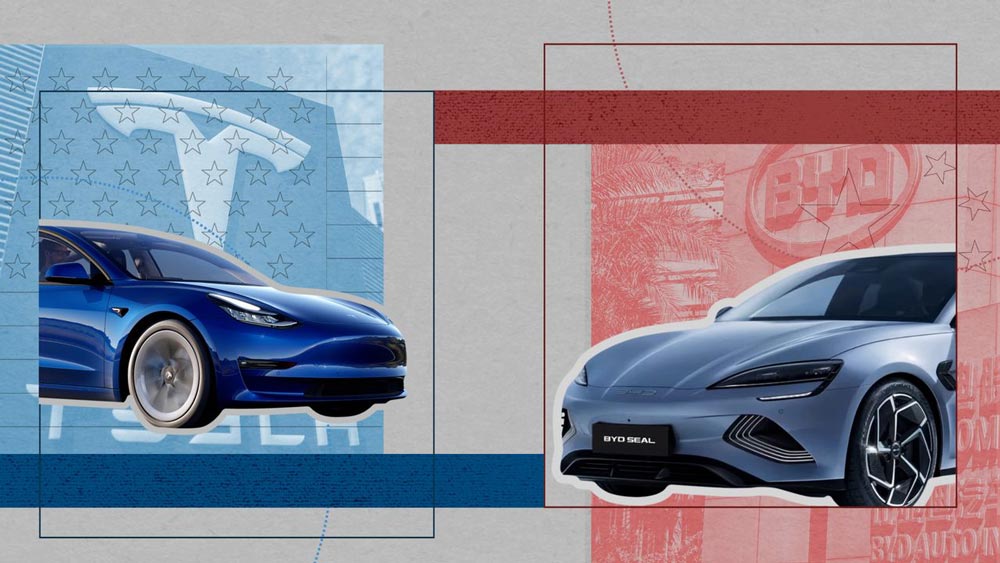Chinese electric vehicle (EV) manufacturers are ramping up their competitive strategies by offering aggressive incentives to attract customers. With a slowing domestic market and increasing pressure from inventory buildup, EV makers like Tesla, Xpeng, Nio, and BYD are initiating bold promotions such as no down payments and five-year interest-free loans. These measures aim to maintain momentum in China, the world’s largest auto market, as the industry grapples with seasonal slowdowns and a challenging economic environment.
Tesla and Xpeng Lead the Charge
Tesla is spearheading the incentives race by announcing an 8,000-yuan ($1,100) insurance subsidy along with a five-year 0% interest financing plan for its Model 3 in China. This offer allows customers to purchase Tesla’s entry-level car with a reduced total price if they make a 34% down payment. The company has also extended the same financing plan to its new Model Y, which is set to begin deliveries in March.
Chinese EV startup Xpeng, however, has taken its promotional efforts a step further. On Wednesday, the company eliminated the down payment altogether for its five-year interest-free financing plan available across four models. Xpeng highlighted this unique offer on social media, emphasizing that it is the only automaker providing both zero down payment and 0% interest financing.
Xpeng had already tested this aggressive strategy back in December by waiving the down payment on its G6 SUV, and the results appear to have encouraged them to expand the offer to other models.
Nio and Other Players Join the Incentives Game
Nio, another prominent Chinese EV maker, introduced its own five-year 0% interest plan for February after experiencing a sharp drop in sales in January. The company’s January deliveries fell to 13,863 units, a significant decline from 31,138 units in December. This new five-year plan is an upgrade from the three-year interest-free loan program it launched earlier in the year.
Li Auto, a competitor, had already rolled out a three-year interest-free plan in November. This flurry of promotions across the EV industry underscores a broader effort to sustain sales amid market challenges.
The Industry Context: A Mixed Landscape
The promotional campaigns come after several major Chinese automakers reported a sharp decline in January deliveries, attributed to seasonal factors and weaker consumer demand. For example, BYD, China’s largest EV maker, saw its sales drop from 509,440 cars in December to 296,446 in January.
The slowdown in deliveries highlights the growing pressure on automakers to clear inventory and maintain growth after years of rapid expansion. According to Stephen Dyer, a partner at consulting firm AlixPartners, the industry is entering a phase of “shakeout,” with weaker players likely to exit the market. In fact, 20 new energy vehicle brands ceased operations in China last year, while 13 new companies entered, resulting in a net reduction of seven brands.
Foreign Automakers Face Growing Challenges
The highly competitive Chinese EV market is also proving difficult for foreign automakers. The rapid adoption of new energy vehicles (NEVs), which include battery-electric and hybrid-powered cars, has pushed foreign brands to adapt quickly. NEVs now account for more than 50% of new passenger cars sold in China, and this share is projected to grow to 86% by 2035, according to Counterpoint Research.
Tesla, while successful in China, faces mounting pressure from local competitors like BYD and Xpeng. Meanwhile, Ford Motor recently announced plans to leverage its China export business to compete globally as Chinese automakers expand aggressively into international markets.
Government Support and Industry Outlook
The Chinese government has played a pivotal role in sustaining EV growth, having issued 81 billion yuan ($11.12 billion) in subsidies for electric cars, smartphones, and home appliances during the Lunar New Year holiday period. However, analysts predict slower industry growth moving forward, as market saturation and economic pressures weigh on both local and foreign brands.
Liz Lee, an associate director at Counterpoint Research, notes that Chinese consumers are often hesitant to jump on early price cuts, preferring to wait for further discounts. This behavior may limit the duration of these aggressive promotions, with experts predicting that most offers will last only one or two months.











